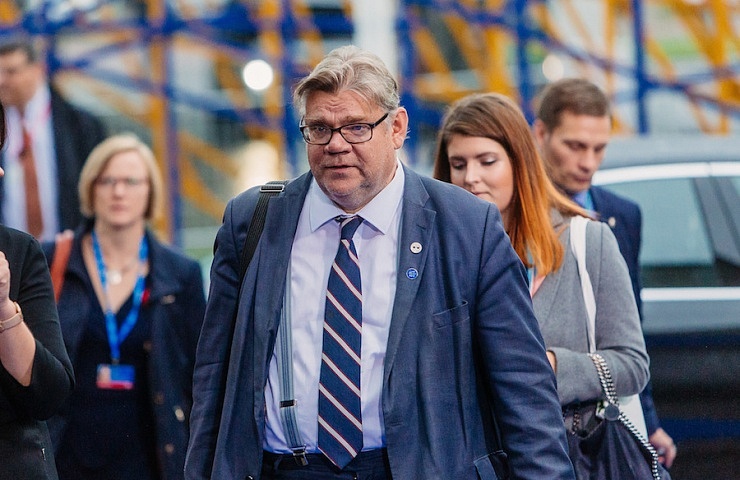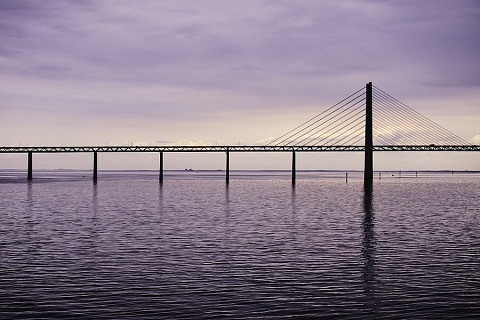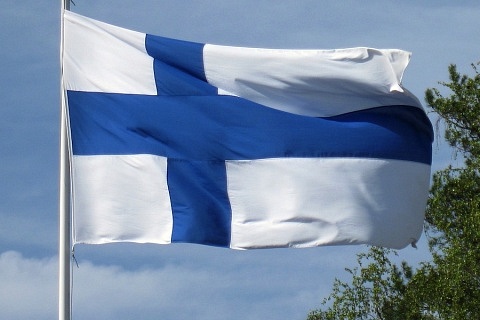Minister for Foreign Affairs Timo Soini’s speech at the Baltic Sea Region Forum 2018, Turku, 14 May 2018.
Let me thank the organizers of this 11th Baltic Sea Region Forum for putting together this event, and for inviting me to address the Forum. Centrum Balticum has established itself as a highly respected platform for cooperation and dialogue on issues relevant to the Baltic Sea region. This event provides yet another opportunity for exchange of views.
Last year, I had the honour to contribute to the “pulloposti” colums of Centrum Balticum – `message in a bottle`. I hope the text is not floating in the Baltic Sea and that you had a chance to read it. If not, you can find my comments on the web page of Centrum Balticum – unfortunately only in Finnish language – titled ` Baltic sea is the sea of destiny of Finland`.
For centuries, our development and well-being has been bound to the Baltic Sea. It has been our gateway to Europe, lifeline and a crucial transport route. Its impact for our security has been huge – in good and in bad times. The Baltic Sea is the sea of destiny for us. In economy and security! This is why it has been one of my priorities since the beginning of my term in office.
That brings me to the topic of today – Baltic Sea region cooperation during challenging times.
The Baltic Sea Region has witnessed a change, following the deteriorating security situation in Europe.
The security situation in the Baltic Sea Region has weakened.
There are more tensions. There have been airspace violations, close encounters of military aircraft or ships, saber rattling, and increase of Russian military activities and exercises. Partly, increased military activity can be explained by Russia´s military reform and armaments programs, but that is not the whole story.
We must not forget the origins of the weakened security situation in Europe. Russian aggression in Ukraine – illegal annexation of Crimea and involvement in Eastern Ukraine – was a turning point.
Thereafter, the concerns have not diminished, rather the contrary. To name some examples: Russian´s role in the war in Syria; policies and practices which are seen as assertive behavior; power policies backed with military show of force.
President Putin just took an oath for the 4th term as Russian President, and most analysts see that no big foreign policy changes can be expected from the Kremlin.
This means that many question marks concerning the intentions or predictability of Russia remain. What next? What is the direction of Russia´s development? Will it continue to drift away from the values and principles, including OSCE commitments that we thought are the cornerstone for European security and cooperation?
But in difficult times, it´s better to remain coolheaded. On the one hand, it´s important to stick to the facts. And on the other hand, we should avoid exaggeration or alarmist reactions.
While tensions have grown in the Baltic Sea region, open military conflict is unlikely. Same can be said about the broader European environment.
Today, the focus has shifted increasingly towards hybrid threats and hybrid influencing.
There are those who remind us that hybrid influencing was part of the military toolbox for centuries. But the modalities have changed the game. Hybrid threats come through digital world, cyber space, internet and social media. Influencing election processes or feeding polarization inside our countries. Governments in the liberal democracies are not able to keep up with the rapidity of the attackers. This is reality today. But we can – and must do better.
We are looking for ways to strengthen our tools to address hybrid threats. The key is to promote ” whole of government”- approach. But we are also engaging the private sector and the civil society can play in countering hybrid threats. In Finland this cooperation is working well.
All countries need to do their homework – to step up their ability to counter hybrid threats. But we also need to do more together. International cooperation is an essential part of countering hybrid threats – that includes regional co-operation, EU, NATO, and co-operation with key partners.
The European Centre of Excellence for Countering Hybrid Threats that was established last year in Helsinki has made a good start. This will also contribute to advancing EU-NATO cooperation where countering hybrid threats is one of the key elements in the common set of proposals.
To consolidate the work within the Ministry for Foreign Affairs and to promote co-operation in this field I decided to establish a new position of Hybrid Ambassador early this year. You will shortly hear comments from our Hybrid Ambassador Mr. Mikko Kinnunen. Not hybrid himself, but a solid security expert – that I am fortunate to have many in my Ministry.
Looking ahead, the tensions in the Baltic Sea area are unlikely to go away until the overall security situation in Europe improves.
And that depends very much on the continuing conflict in eastern Ukraine. Fighting is not going to bring peace. The way forward to end the conflict is the implementation of the Minsk agreements.
At the same time we need to develop the tools to counter new threats and to improve deterrence. In Finland, the process is underway to improve legislation concerning intelligence gathering and capabilities. Some time ago we adopted legislation relating to international assistance, including military assistance.
It has now become a mantra to stress that both deterrence and dialogue are needed to promote stability in the current security environment. Both are needed, and they do not exclude one another.
Finland´s national defense provides deterrence and contributes to the security and stability of the Baltic Sea region. There was a time when the post-Cold War enthusiasm led many countries to reduce their defense capabilities. We did not follow that path. Some were wondering why Finland stubbornly maintained such a sizable military force. I haven´t heard such comments lately.
The changing security environment requires an effective and rapidly deployable military capability which, for its part, strengthens stability in the Baltic Sea region and further afield.
But we also understand the importance and emphasize the need for dialogue with Russia. Dealing with Russia in economic and political terms has always been both natural and necessary for us. Russia is part of Europe and will remain so. There are always practical issues between neighboring countries which should be discussed. But we should also be able to have dialogue on issues that divide us. There is a place for dialogue even when the EU sanctions are in place. And as things stand, the sanctions need to remain in place.
Finland and Sweden are in the same boat.
Relations between Finland and Sweden have always been close, due to geography, history and common values. We share a common security environment. The deterioration of the security situation in the Baltic Sea has further underlined the need to enhance our co-operation in the field of foreign and security policy.
This co-operation has developed fast over the past years.
We have intensified bilateral dialogue at all levels and also in wider fora. The 29+2 co-operation with NATO and the Common Security and Defence Policy of the EU are pertinent examples of areas where Sweden and Finland have intensified common efforts. We aim for tight cooperation in within the Permanent Structured Cooperation of the EU. To take another topical example, Sweden has assumed an active role in the European Centre of Excellence for Countering Hybrid Threats. There is also new impetus for co-operation in cyber issues.
Also the cooperation in the field of defense has been intensified, and as our Government has stated in the Defense White Paper, “no predetermined limits will be set on deepening the bilateral defense co-operation”. We also work closely together in the EU and NATO context and contribute to broader European cooperation.
Just last week, Finland and Sweden signed a trilateral Statement of Intent, together with the United States, with a view to deepening our defense cooperation. We both – Sweden and Finland – see a need and value of transatlantic co-operation for the European security and stability, and also for the Baltic Sea region.
The Baltic Sea is a European sea and thus a key area for the security of the EU’s as well as Nato.
The Baltic Sea has a special economic and security interest for all the countries in the region. This is sometimes forgotten when we discuss the heighten tensions in Europe. For Finns one practical issue is economic prosperity and the freedom of navigation – and hence the security of supply. Finland and Sweden have wider common interests and therefore special knowledge about the Baltic Sea Region. When combined this knowledge and know- how is also important to other EU countries and Nato. This is why the 29+2 cooperation in Nato continues to be very useful for all parties.
Finland is actively working to further strengthen the European Union as a security community. A stronger EU produces stability and security in Europe, including in the Baltic Sea region. The co-operation between the Baltic Sea countries can also be advanced through the EU Strategy for the Baltic Sea Region.
Currently big headway is being made to strengthen defense cooperation within the EU. Permanent Structured Cooperation was launched at the end of last year. Hopefully the European Defense Fund will move forward speedily and produce concrete results. We are a strong supporter of these efforts.
The development of EU´s security and defense cooperation underlines the importance of smooth and close cooperation between the EU and NATO.
The two organizations have shared interests in the Baltic Sea Region. I welcome the rapid progress made in the co-operation. Countering hybrid threats and enhancing military mobility are concrete fields of cooperation where we expect early results.
From Finland`s perspective, NATO presence – Enhanced Forward Presence – has a stabilizing impact in the Baltic Sea region. We have also welcomed NATO’s two-track approach: deterrence and dialogue.
A common security environment means converging interests. Our partnership with NATO has developed in a positive way over the past few years. The cooperation relating to the Baltic Sea security has played a big role in this regard. The so called 29+2 cooperation between NATO, Finland and Sweden, has been mutually beneficial. The increased number of joint military exercises provides new opportunities also for our defense forces to improve their capabilities and interoperability.
I also want to emphasize the importance of regional cooperation in promoting security and stability.
The stability and predictability of the Baltic Sea region is a shared interest. The Baltic Sea states have long traditions in a wide-ranging cooperation in many formations.
The Council of the Baltic Sea States has continued its important work – for instance, in the fields of civil protection and science institutions. We believe that regular meetings also at political level should be continued in spite of current tensions – just as is the case in the Arctic Council in which Finland is currently holding the chairmanship. The new Strategy for the Baltic Sea Region adopted by our Government last year sets our goals for Baltic Sea cooperation, including measures to improve the environmental status of the sea and increase the region´s security and prosperity in a sustainable manner.
Another good example of regional cooperation is the work done in the International Civil Aviation Organization (ICAO) context to improve flight safety in the Baltic Sea area. Practical measures have been agreed to reduce risks of increased flight traffic – both military and civilian aviation – over the Baltic Sea. Hopefully these steps also contribute to confidence building.
To conclude, I want to stress the need for improving resilience of our societies. We need to be prepared to address hybrid influencing, and to counter disinformation or rapidly spreading false news. I believe that true and sustainable security begins from every individual- with education, economic opportunities and equality.
Thank you for your attention and have a successful conference in Turku.

 Deutsch
Deutsch




Leave a Reply